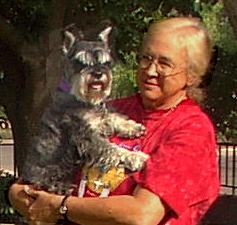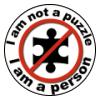

Over 50 years ago I was diagnosed with autism. With the main "treatment" at that time being institutionalization, and forgetting the child was ever born, I was simply allowed to find my own way. No one, including me, was told that I had a disability. The atmosphere at the time was blaming the mother for being distant and cold - a "Refrigerator Mother." In self-defense, my mother never told anyone about the diagnosis.
Since re-diagnosing myself a few years ago I have come to a fair understanding of the disorder called Autism, and these links are intended to explain some of that. The primary thing I want to get across is that we are people of a different nature, not walking mistakes. There is good as well as disability in our differentness. We are more to be studied than pitied. Oddly, professionals dealing with "the autism problem" seldom seek the advice of adults with autism when they write out programs. People who want a real, live autistic adult to address a group on the subject of autism from the inside can contact me by email at < patty at autistics . cc > . You will need to remove the spaces and change "at" to "@" to make this address work in email (this is a ploy to keep me from getting more junk email).
I have received a number of very long emails with plans for a child's future in great detail for the next 10 or 15 years, and also long, detailed accounts of what a child cannot do and pleas to have me tell the parent how to fix the child. The answers are twofold: (1) after 10 or 15 years the child will be pushing to move in certain directions if able to communicate. Communication is not necessarily in speech - children should learn keyboarding or sign language if they have great difficulty speaking. (2) I cannot "fix" your child, and neither can you. Some have metabolic problems that can be addressed, and you might find those. Most simply learn a lot as they get older and look very different at age 9 or 18 than they did when diagnosed with autism at age 2 or 3. Believe in that change and help the child learn.
It may seem surprising, but people with autism need peer support. Once we can communicate with our fellows and see that life can be joyous, not just shameful, with our neurological setup, we can accept ourselves and go on to do what we can do. There is no need to turn inward and keep the disapproving eyes of the world tuned out, once we understand that we are acceptable human beings as we are.
 You can order this pin from http://www.autistics.us
You can order this pin from http://www.autistics.us